- Home
- Cynthia Kadohata
A Place to Belong Page 6
A Place to Belong Read online
Page 6
Papa began moving suddenly, so they all did. “Do you remember where we’re going, Papa?” Hanako asked.
“Yes. I just had to find everything in my memory.”
Hanako pictured her father’s brain like a bunch of shelves with boxes on them. He could search through the boxes until he found what he was looking for, and then he would have no problems remembering. Hanako’s brain wasn’t like that at all—it was just a big mash-up.
It felt quite odd walking and walking to wherever, to meet her grandparents for the first time, not having any of her things. Not even having a gift for her grandparents. She had packed so carefully: six skirts—three for summer and three for winter. Six white blouses. Twelve pencils with erasers and a notebook. Five toothbrushes and toothpaste. She didn’t bring soap because Mama said they would have that in Japan. Her pajamas, of course. And a gift for her grandmother: a pretty, empty glass perfume bottle that her mother’s only sister, Jean, had given her. Many Japanese Americans had both American and Japanese names that they used, but Auntie only called herself “Jean,” and Hanako didn’t even know her other name. You could just barely smell the perfume that had once been in there. Hanako would sniff it in camp sometimes, and it smelled like another world, the world she knew Mama had lived in while she was dating Papa—Hanako had seen pictures of her all dressed up. Mama said that even if you didn’t have a lot of money, you got to live in that world while your future husband was courting you. It was a world that had once been in Hanako’s future for certain, before the war had broken everything in half. Now and then, even after they had kids, some of her parents’ friends had gone dancing on Saturdays while somebody babysat their kids. But Papa always worked Saturday nights, and Mama stayed home with Hanako and Akira. Her parents had seemed happy, though—back then, a million years ago.
But she had to pay attention now; here beyond the village, the ground had grown uneven, and it was harder to walk. There were rocks and weeds, bushes and trees, everywhere.
“This is the land time forgot!” Akira cried out. “I read about it in a book!”
And so it was. Hanako had the feeling that she was in a book, that she had stepped off the path of real life. And yet something felt good. It felt like nothing could hurt them here. A giant bomb had fallen, and even that could not hurt this special place.
As they walked, Papa moved as though he was sure where he was going. He even started humming! At one point he stopped and stared at a small wooden house with a slanted roof. In the yard surrounding it were two large pine trees and several others Hanako didn’t recognize.
Papa was tilting his head, his lips pressed slightly together. “When I walked away last time, more than seventeen years ago, I never looked back. I just kept walking.”
Hanako remembered that when they were leaving their own house for the last time, she had stared back the whole way. “Why, Papa?” she asked.
“Because I was scared it would make me change my mind.”
Mama grunted as she let Akira slip to the ground. She was sweating, her hair sticking to her face.
Hanako realized she was sweating as well. She wondered if she looked sloppy. She wondered if her grandparents would like her. She wiped her face with the back of her hand, but then Akira said, “You wiped dirt all over your face.”
Oh no! “Aki, will you clean it off?”
She knelt down, and he wiped his coat sleeve across her forehead. “It’s worse now,” he said. “Sorry.”
But Papa had started striding quickly toward the house, and Akira ran after him. Mama started off as well, but Hanako was worried about her dirty face. She liked to make a good impression. She wasn’t like Akira, who never cared what anybody thought.
Papa seemed to read her mind. He stopped abruptly and turned around. “Come on, Hanako. This is family.” He strode back for her. She let herself be pulled along by him, taking in all the details. Her grandparents’ house! They had traveled across an ocean to get here! The house was square, with a narrow, covered engawa wrapped around it. Many of the farmhouses they’d passed were two stories high, but this was one story.
Papa knocked on the door, calling out, “Otōsan, tadaima modori mashita!” It meant “Father, I’m home!” Spoken politely and with respect. In Japan people had different ways of saying things depending on the standing of whom they were talking to.
Hanako heard noise from inside, and she quickly stepped behind her father as the door slid open. A little man was standing on the threshold, not nearly filling it.
And just like that, she fell in love with her jiichan! He took her breath away! He was so small, he was almost like a child, and he nodded his head yes over and over. His skin was wrinkly like a prune. Yes, he looked exactly like a sweet prune. He looked more like a prune than an actual prune did—sweeter and more wrinkly. Papa stepped forward, a look almost of awe on his face, and then he and Jiichan hugged tightly, which Hanako knew was unusual among Japanese people. But Papa was American.
“Nyōbō desu,” Papa immediately said, introducing Mama.
Mama bowed repeatedly and mumbled something over and over. She seemed overwhelmed.
“Hanako,” Papa said to the old man, pulling Hanako from behind him. “Hanako, this is your jiichan,” he added.
Before Hanako could bow and greet her grandfather, Jiichan cried out passionately, “I speak English! Yes, I do! It does a talent I learn in America many years before you.” He had a funny, kind of high voice, almost like a cartoon character—like Akira’s voice, except in an old man. He was Akira decades from now!
Hanako wasn’t sure what he meant—before she learned English?—but she curtsied, then thought that was wrong, so she quickly bowed instead. Jiichan put out his hand, and he and Hanako very firmly shook. Still holding her hand, he pushed his face forward and looked at her intensely, startling her, but then he laughed. “That how I learn in America to shake hand. I take class. You supposed to look in eye, then shake firm.”
Hanako giggled shyly.
“And this is Akira,” Papa said. Akira had taken Hanako’s spot behind Papa, peeking from behind him.
“Healthy children! I can see it! Much health happens in America, do you think?”
Jiichan was speaking right at Hanako! “Hai . . . Yes,” was all she could think to say. She bowed again, just for good measure.
He laughed. “She likes to bow, neh? Is she always this dirty? I work in field, I like dirt! The cold! Come in, come in.”
“Arigatō gozaimasu,” Hanako said, bowing yet again.
“You must speak the English. We have been practice it since we heard you are coming.”
They carried their things inside. Hanako immediately took off her shoes.
“Such small feet. How do you balance?” Jiichan asked, laughing like an imp. “We will laugh at each other, and life will have beautiful!”
Suddenly, Akira ran up to Jiichan and threw his arms around him.
“Ahhh,” Jiichan said. “American like to hug.” As he hugged Akira, he glanced at Hanako’s feet again. He lifted Akira with a big, big grunt, staggering sideways before finding his balance. “She inherit my feet, neh?” he asked Papa. “Look at my feet.” He held up a tiny foot and almost fell over. As he set Akira down, he nodded modestly. “Yes, yes, for old man I have powers—my feet have traveled across the ocean until now this girl has my same feet.”
“Absolutely,” Papa said.
Then Jiichan’s jaw fell as he studied Akira’s wine stain. “Ahhh,” he said. “Ahhh. Ungaii!” He touched Akira’s stain and said, “This thing will give him much luck. It is good color, I like very much.”
Akira looked like he would explode with pride.
“Otōsan, it’s good to be here,” Papa said. “You have no idea. And where is Okaasan?”
“She trying to buy futon. Every day after work she look for futon for good price. If she doesn’t find, the children will sleep on floor. Sit down, I will make you tea. It will not be—ah, what’s the word?—fancy, but
it will be tea.”
“Oh, let me make that!” Mama said.
“No, no. How long you have traveled? The energy is all mine. You will find that I am never tired.” Then he nodded. “Ahh, well, as I am older, I am more tired some days. I cannot lie. I am old.”
“Ah, you will never be old!” Papa said. “But do you have water? We drank our water on the train, and the children never complained.”
Jiichan looked shocked. “You must let them complain when they live here!” he said. “When you are young and when you are old, you may complain. In the middle you have to—”
“Take your lumps,” Papa finished.
“Nani?” Jiichan asked. That meant something like “Eh?” or “What?” But he left the room and quickly returned with a tray of water glasses. It felt so good to drink!
They sat at the kotatsu on the living room floor. A kotatsu was a low table frame, covered by a futon or a heavy blanket, which in turn was covered with a tabletop. Underneath was a coal-burning heater. You were supposed to sit on the floor and put your legs under the blanket. This would keep you warm during the winter months. They’d used a kotatsu at the barrack they’d lived in at Tule Lake.
Hanako gladly sat at the table and soaked up the warmth. A kotatsu was something comforting. She looked around the small living room. The floor was covered with tan tatami, and the walls were gray blue. Tatami were thin straw mats. A Japanese scroll hung on a wall; it was a picture of Mount Fuji. Fake orchids sprouted out of a planter next to a big basket in a corner. Everything looked old. Jiichan came back with the tea and said, “Nothing fancy. Nothing fancy.”
As Hanako straightened out her skirt, she noticed how dirty her legs were. She looked like she had walked through mud! “I’m so dirty!” she exclaimed.
“You are very dirty! There is water in tub if you wish to clean!” Jiichan exclaimed back. He seemed surprised at how loudly she’d spoken. “I will show you!”
She followed him into a small kitchen and then to a tiny adjoining room. Everything here was small. But the square wooden tub with a fire underneath it was very big. Hanako asked, “Is it all right? May I take a bath?”
“Yes, of course you must take bath!” Jiichan said. “I insist you must! Do you know Japanese bath? You must clean off first and then get in tub to soak. There is tenugui to dry yourself.” He indicated some plain folded cloths. “A bath is very good.”
Jiichan put his fingertips to the sides of his forehead as if that helped him think, and then he said, “Yes, this is good idea.” He brought his hands back down and smiled. “I’m very pleased tub has made your happiness.”
Then he left.
Hanako paused, considering whether her parents might be mad that she was taking a bath instead of talking at the table. Also, she knew it wasn’t her turn to bathe. At camp Mama had told her what life would be like in Japan. Everybody would take a separate bath one after the other in the same water in a deep wooden tub. The oldest and most important took their bath first, then the next oldest, and so on. Men before women. Mama had also told her that it would probably become her job to heat the bathwater, the same water night after night until it got too musty to use anymore. She looked uncertainly at the small fire underneath. She’d been warned that Japanese take very hot baths.
There was a pail and a big bowl. She undressed. It was the first time she had undressed in private in several years. Then she wetted a tenugui and washed herself with soap, rinsing by pouring the bowl on herself. There was a drain in the floor.
The side of the tub was actually quite high. Hanako climbed in and sank into the water. When she sat up, water came to her chin—Akira would need to stand while he bathed! Ahhh. The heat was not as shocking as she’d expected. That is, it was startling but not shocking. She hadn’t taken a bath since before camp. For the Japanese, soaking in a bathtub was as important a daily activity as eating and sleeping, because it made you strong and healthy. She closed her eyes and felt the heat and water make her stronger, change her.
CHAPTER
TWELVE
When she heard laughter from the other room she stood up, eager to talk to her grandfather, who was different from anyone else she had ever met. She dried herself with a scratchy tenugui. As she reached her feet, she saw how dirty her toes still were. She rubbed on them with the towel. Then she heard more laughter and didn’t want to take time cleaning herself further. She put her dirty clothes back on.
Back in the living room, everyone was drinking tea. But Akira jumped up when he saw her. “I was waiting for you! I have to make shi-shi!”
“Outhouse in back, but he want to go with you,” Jiichan said.
“I’ll only go with Hana!” Aki confirmed.
Hanako and her brother had used many outhouses. Back in California, when Papa wanted something really fresh for the restaurant, he sometimes took them with him to a farm, where he bought butter, milk, or meat. He did this whenever somebody booked the restaurant for a special occasion. The farms often had outhouses that Hanako and Akira would use. Akira hated them—he worried he was so skinny he might fall into the hole by accident. This was actually not possible because the hole wasn’t big enough, but Hanako always had to go with him and hold on to both of his hands.
So they went outside and saw a small wooden building with what looked like a sheet of tin on top. Right inside the door was a pair of slippers. When Hanako opened the door, she saw a wooden lid on the floor. “I guess you have to squat,” she said.
“I don’t want to.”
“I know, but you have to.”
“You do it first so I know it’s safe.”
Hanako thought this over. She put on the slippers and stepped carefully into the outhouse, then lifted the lid. She squatted over the hole, and when she was done, she took a square of newspaper from beside the lid and wiped herself. The paper was rough and scratchy.
“There you go!” she said to Akira. “I can confirm it’s safe!”
So she stepped outside, where Akira put on the slippers. After he had finished, he pulled up his pants and said with satisfaction, “I like it. It’s safer than American outhouses.”
That made no sense, but she let it go, because Akira was Akira.
Back inside, there were now two teapots on the table, and when Hanako sat down, Mama poured her a cup. She knew it was barley tea for her and sencha for the grown-ups. She sipped at it and smiled. The tea was like the bath: it made her stronger. She slipped her legs under the blanket. She felt such a surge of optimism that she wondered for a second whether she’d been hallucinating when she saw Hiroshima.
But then Akira blurted out, “I saw a boy with scars and only one ear! He was in the train station! And I saw a soldier with no pants on the train! The boy’s face was all pink! And he had a little sister or someone with him!”
Jiichan’s face suddenly turned sad. “So you have seen Hiroshima.”
Papa nodded. “It was hard to believe what we were seeing, even when we were staring right at it. Was there really only one bomb?” he asked.
Jiichan filled his cheeks with air, looking for a moment like a round-faced doll. Then he puffed out the air and frowned. “Just one. Many air raid, but all false alarm. Let me say this even in front of your children. There were many thousand of dead body—floating on river, piled in field, lying in road. Everywhere. From far away they look black because covered with fly. I have seen this myself. So many fly buzz in city, I do not know where so many fly can come from. They look like dark cloud that move over the body. I travel to city every month with all my vegetable to sell in cart. But after bomb I walk with all my neighbor to city to give away our vegetable. I tell you something: I hear much that people help other people right after bomb. Their skin hang from body, but they stop to help. So you see? Maybe worst day in history. Maybe. But on worst day in history, people stop to help.”
Hanako was leaning forward, her elbows on the table. “So were there a lot of bodies?”
“So many. One second a
live, next second dead. I see this myself. I see a man alive, walking, then he dead. I think he die standing up.”
“The pink boy had a claw for his right hand!” Akira blurted out.
Hanako hadn’t noticed that!
“Many children like that. We call them sensō koji. Ahhh, how to translate?” He looked at Papa.
“War orphan,” Papa said.
“Are they starving?” Hanako asked. She herself had been hungry a few times, but she’d never been starving. So she had no idea what “starving” truly, truly meant. But the way she imagined it was feeling like long nails were sticking into your stomach. She knew it must hurt. She clutched at her stomach, felt a stab in there.
“Hai, some starve.” Jiichan was silent for a moment, then said to Hanako, “What thought did you have of city?”
Hanako paused. Then she said, “It was worse than the camps. I felt grateful I wasn’t out there. Where we were was good compared to that!”
Nobody answered at first, but Jiichan nodded thoughtfully before saying, “I no expert—I never live in prison. But to compare lose freedom to get bomb and starve and die, there is no sense. If worse thing than jail, does not make jail good.”
Hanako felt kind of rebuked. She slumped her shoulders, embarrassed. But Jiichan smiled at her, and then his smile grew. “You are right, I am wrong.” He pressed the tips of his fingers into his forehead again, concentrating. “I mean to say . . . and it is, you must forgive America. I see and hear many bad in world, many bad. After bomb explode, black rain fall from sky. Big black raindrop. I don’t see this one myself, but it is story I hear people say. I am sorry to tell these many thing in front of my grandchildren. Why I tell it, it is that I want to say, there is many bad, but there is also many good. So we move forward in life, neh? When we can, we move forward.”
For some reason, Jiichan’s words felt like a puff of air on Hanako’s face. And it was funny how that little puff of air could blow away so much. She had this sensation that America was suddenly far away not only in distance but in time as well. The camps were a million years ago. The boat trip just ended but might as well have been decades in the past.

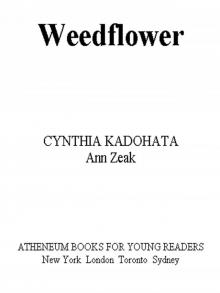 Weedflower
Weedflower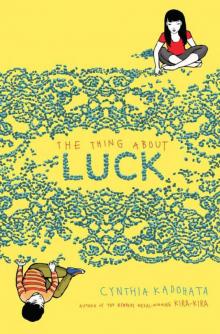 The Thing About Luck
The Thing About Luck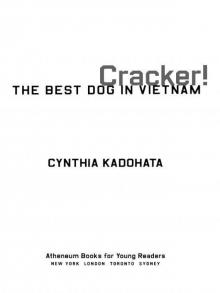 Cracker!: The Best Dog in Vietnam
Cracker!: The Best Dog in Vietnam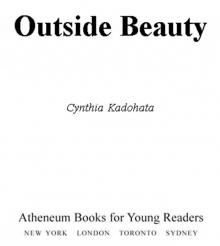 Outside Beauty
Outside Beauty The Glass Mountains
The Glass Mountains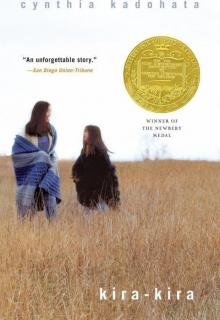 Kira-Kira
Kira-Kira Checked
Checked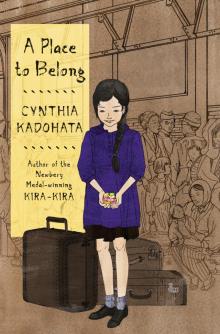 A Place to Belong
A Place to Belong A Million Shades of Gray
A Million Shades of Gray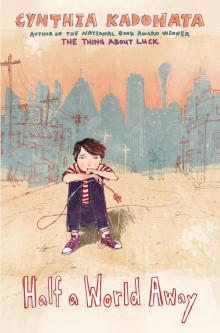 Half a World Away
Half a World Away